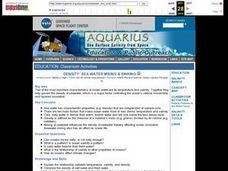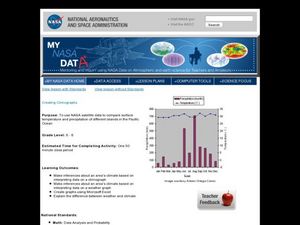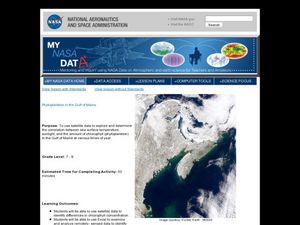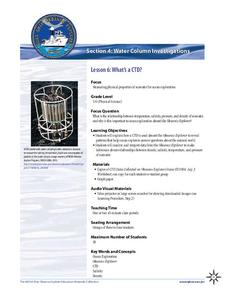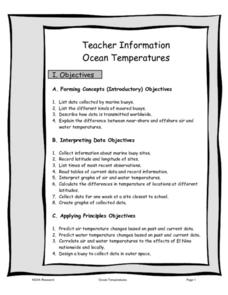Curated OER
Temperature Affects The Heart Rate
Students relate heart rate and development to environmental conditions through experiment. In cooperative groups, students record the heart rate in developing zebra fish. Groups create a standard curve to predict the temperature at...
Curated OER
Surface Air Temperature Trends of the Caribbean
Learners use real satellite data to determine the changes in near-surface air temperature at different times of the year over the Caribbean Sea. They discover how Earth's tilt causes seasonal differences in incoming solar energy. They...
Curated OER
Sea Water Mixing and Sinking
Students investigate the role of temperature and salinity in determining seawater density. They use a Temperature-Salinity Diagram to examine the effects of mixing on density.
Curated OER
Creating Climographs
Students use satellite data to compare precipitation and surface temperatures on different islands. In this satellite lesson students create graphs and explain the differences between weather and climate.
Curated OER
Phytoplankton in the Gulf of Maine
Learners use satellite data to see the correlation between sea temperature and sunlight in the Gulf of Maine. For this phytoplankton lesson students use Excel to analyze data.
Curated OER
World Geography - Climate Notes
A challenging activity helps young geographers explore the temperatures around the world! They study how the Earth's land temperatures are affected by their proximity to an ocean, as well their latitude and their altitude. A very...
Curated OER
It's a Gas! Or is it?
Oceanography enthusiasts are given a series of thought experiments to consider in order to relate the solubility of gases and solids to underwater volcanoes. It is not particularly engaging to perform these thought experiments. Choose...
Curated OER
Hurricane Frequency and Intensity
Students examine hurricanes. In this web-based meteorology lesson, students study the relationship between ocean temperature and hurricane intensity. They differentiate between intensity and frequency of hurricanes.
Centers for Ocean Sciences
Ocean and Great Lakes Literacy: Principle 1
Is your current lesson plan for salt and freshwater literacy leaving you high and dry? If so, dive into part one of a seven-part series that explores the physical features of Earth's salt and freshwater sources. Junior hydrologists...
Curated OER
Ocean Impacts of an El Nino Event
Students study sea surface height and temperature and other characteristics of an El Nino. In this ocean impacts lesson students examine the factors that influence an El Nino or La Nina.
Curated OER
Ocean Currents
Students examine ocean currents. In this investigative lesson, students examine ocean currents and the relationship between the ocean, our atmosphere, and the weather. They will create a model of an ocean current.
Curated OER
What Lives in the Open Ocean and Where Do They Live?
Learners explore oceanography by participating in a flash card activity. In this ocean inhabitant lesson, students define a list of ocean related vocabulary terms and answer ocean geography study questions. Learners utilize organism...
Curated OER
Ocean Voyage Scavenger Hunt
In this ocean voyage worksheet, students utilize the Internet to access one specific website to find the answers to five short answer questions about oceans.
Curated OER
One World Ocean
Learners compare and contrast the properties of salt water in the oceans/seas and freshwater elsewhere on the planet. They also analyze mixing caused by currents in the ocean, including the effects of warm and cold water as well as with...
NOAA
Climographs
In the second lesson of a five-part series, young climatologists use provided temperature and precipitation data to create climographs of three different cities. They then analyze these climographs to develop a general understanding of...
NOAA
What's a CTD?
Why are the properties of the water important when exploring the ocean? Young scientists discover the tools and technology used in deep sea exploration in the fourth installment in a five-part series. Groups work together to examine...
NOAA
The Oceanographic Yo-yo
How does chemistry help deep-sea explorers? Part four of a five-part series of lessons from aboard the Okeanos Explorer introduces middle school scientists to technologies used in ocean exploration. Groups work together to analyze data...
NOAA
Currents
A deep ocean current circles the globe at a force that is greater than 16 times all the world's rivers combined. Groups analyze the effects of submarine topography on deep ocean current speed. They then determine how this speed affects...
American Museum of Natural History
What is Marine Biology?
A marine environment covers the majority of the earth but is arguably the least understood. Teach young scientists about the characteristics of oceans and ocean species using an interactive online lesson. The in-person or remote learning...
Curated OER
Deep Ocean Currents
Students observe the interactions of different temperatures of water using colored ice and a thermometer and then compare the results with global ocean current solar heating. They identify where floating ice would be found in the ocean,...
Curated OER
How Temperature Affects Density
Students examine the effects of temperature and density in ocean currents. In this density lesson, students explain how coastal climates are impacted by ocean currents. They investigate how the ocean currents are affected by temperature...
Curated OER
Ocean Temperatures
Students list data collected by marine buoys and the different kinds of moored buoys. They describe how data is transmitted worldwide. They explain the difference between near shore and offshore air and water temperatures.
Curated OER
Ocean Currents
Learners determine how water and wind affect ocean currents. In this science investigation lesson, students follow the provided steps to enable them to consider how explorers may have used ocean currents to their advantage.
Curated OER
Marine Fisheries Management
Almost 200 slides make this a vast collection! It is a quirky collection, titled "Marine Fisheries Management," but having little to do with that occupation. What you will find are two-toned blue backgrounds with no pictures, but a few...




